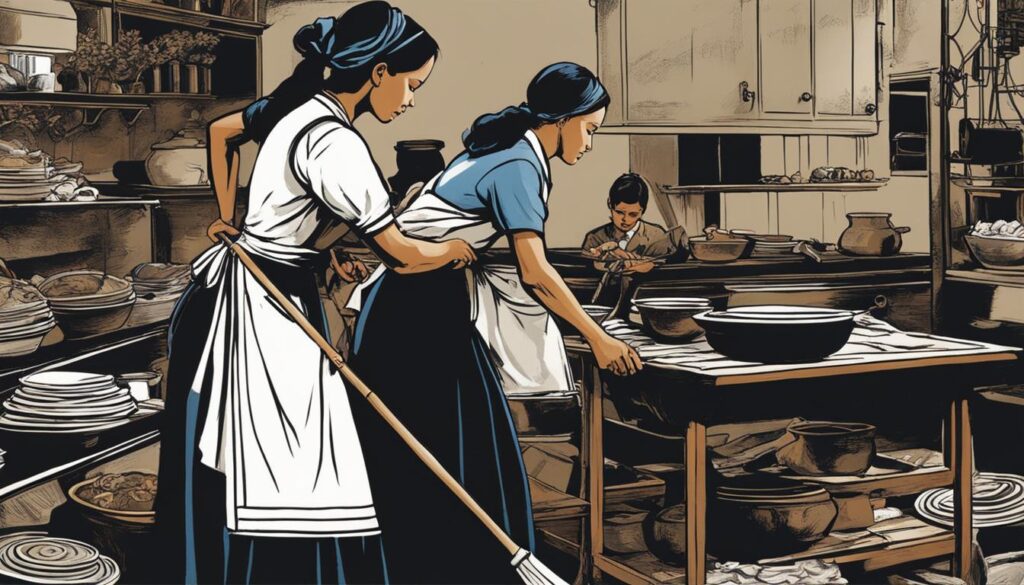Stephanie Land’s memoir, Maid, is a powerful account of resilience and determination. This inspiring book tells the story of her journey as a single mother, working hard to make ends meet while facing numerous challenges. In this article, we will take a closer look at the book and explore the themes of Maid, including poverty, the working class, and social justice. We’ll analyze Land’s impactful writing style and evaluate the audiobook version’s narration. Additionally, we’ll discuss the significance of Stephanie Land’s story and provide recommendations for readers who enjoyed this memoir.
Through her honest and captivating storytelling, Stephanie Land sheds light on the harsh realities faced by many low-income families in America today. Her memoir is a testament to the resilience of the human spirit and a powerful call for change. Join us as we dive deeper into Maid and explore the world of Stephanie Land together.
Overview of “Maid”
Stephanie Land’s memoir, “Maid: Hard Work, Low Pay, and a Mother’s Will to Survive,” chronicles her journey as a single mother working as a maid to make ends meet. Born in rural Washington State, Land’s life changed dramatically after an unexpected pregnancy and subsequent separation from her boyfriend. With no support from her family, Land was forced to rely on welfare to provide for herself and her daughter.
Despite the challenges she faced, Land was determined to create a better life for her daughter and herself. She began working as a maid, a job that offered low pay and little job security but provided a flexible schedule to allow her to attend college classes.
The heart of “Maid” lies in Land’s resolute determination to better her circumstances, never allowing adversity to hold her down. Through her writing, she sheds light on the reality faced by many low-wage workers, exposing the harsh truths of poverty and the working class.
Image:
Resilience in the Face of Adversity
Stephanie Land’s memoir, “Maid: Hard Work, Low Pay, and a Mother’s Will to Survive,” is a powerful account of her unwavering determination and resilience in the face of numerous challenges and obstacles. Despite being a single mother living in poverty, Land refused to give up and persistently worked hard to provide for her daughter.
Throughout the book, Land recounts the adversity she faced, including being homeless, working long hours for low pay, and dealing with unreliable childcare. Despite these challenges, she found the will to keep pushing forward, determined to provide a better life for her family.
Land’s resilience in the face of adversity is a powerful reminder that even in the most difficult of circumstances, we can find the strength to keep going. Her story is a testament to the human spirit and the power of determination in overcoming life’s many challenges.
Challenges Faced by Stephanie Land
| Challenge | Impact | How Stephanie Overcame It |
|---|---|---|
| Homelessness | Unable to provide a stable living environment for her daughter | Worked long hours to save money for an apartment |
| Low Pay | Unable to afford basic necessities and provide for her family | Continued to work hard and took on side jobs to make ends meet |
| Unreliable Childcare | Made it difficult to work long hours and support her daughter | Sought out alternative options and relied on support from friends and family |
The challenges faced by Stephanie Land were immense, but her determination and resilience allowed her to persevere and create a better life for herself and her family. Her story is an inspiration to all those facing adversity and serves as a powerful reminder that there is always hope, even in the darkest of times.
Stephanie Land’s Journey
Stephanie Land’s journey documented in her memoir “Maid: Hard Work, Low Pay, and a Mother’s Will to Survive” is a powerful testament to the resilience of the human spirit. As a working single mother, Land details her experiences and struggles in an honest and unflinching manner, shedding light on the challenges faced by those in similar situations.
From working multiple jobs to make ends meet to navigating an often unsupportive welfare system, Land’s journey is a harrowing tale of grit and determination. Despite the odds stacked against her, Land refused to give up, demonstrating the strength and resilience that so many individuals in similar circumstances possess.
The book offers a glimpse into the day-to-day struggles of those living in poverty in the United States, highlighting the various hurdles and obstacles that must be navigated in order to simply survive. Land’s journey offers a perspective on poverty not often seen in mainstream media, giving a voice to those who are often silenced.
Throughout her journey, Land faces numerous challenges, from living in overcrowded and unsanitary conditions to experiencing domestic abuse. These struggles are all too real for many individuals living in poverty, and Land does not shy away from documenting their impact on her mental and physical well-being.
Despite the often-difficult subject matter, Land’s writing style is engaging and impactful, drawing readers into her world and evoking a sense of empathy and understanding. Her memoir serves as a reminder of the importance of sharing stories, no matter how difficult they may be.
Exploring Poverty and the Working Class
Stephanie Land’s memoir offers a raw and poignant glimpse into the realities of poverty and the working class. From the struggles of living paycheck to paycheck to the constant battle to provide for oneself and one’s family, Land paints a vivid picture of the challenges faced by those living in poverty. Through her experiences as a single mother working as a house cleaner, Land draws attention to the larger socio-economic issues at play, highlighting the systemic barriers that perpetuate cycles of poverty.
The book sheds light on the often-overlooked struggles of the working class, whose hard work and determination are met with low pay and limited opportunities for upward mobility. Land’s compelling narrative places a human face on the statistics and data surrounding poverty, emphasizing the toll it takes on individuals and families.
Through her powerful storytelling, Land emphasizes the need for action to address the root causes of poverty and to create a more equitable society for all. Her message is an urgent call to action for policymakers and for individuals alike to take steps towards a more just and equitable future.
Impactful Writing Style
Stephanie Land’s writing style is both impactful and engaging, effectively conveying her story to readers and creating a strong emotional connection. Through vivid and descriptive language, Land paints a vivid picture of her experiences, allowing readers to fully immerse themselves in her world and empathize with her struggles.
One of the most notable aspects of Land’s writing style is her ability to balance raw honesty with a captivating narrative. She doesn’t shy away from difficult topics or sugarcoat her experiences, yet she presents them in a way that keeps readers invested in her story, eager to learn more and see how it unfolds.
Furthermore, Land uses her writing as a means of advocacy, shedding light on larger societal issues related to poverty, inequality, and social justice. By sharing her story and personal experiences, she draws attention to important issues and encourages readers to take action and make a difference.
Themes of Inequality and Social Justice
Stephanie Land’s “Maid” delves into the inherent inequalities faced by the working class and highlights the need for social justice. The memoir portrays the stark difference between the social classes in America, resulting in a system that favors the affluent and traps the impoverished.
Land’s story is a stark reminder that poverty is not a choice and that social mobility is often an unattainable dream. Through “Maid,” she advocates for change, shedding light on the harsh realities of socio-economic disparity and the need for policies that address these issues.
The author employs vivid language and personal anecdotes to emphasize the struggles faced by the working class, ultimately questioning the fairness of the current economic system. Her narrative highlights the need for advocacy and action to bring about broader social change and a more equal society.
Inequality Comparison
| Income Bracket | Income Share | Top 1% Income Share |
|---|---|---|
| Bottom 50% | 13% | 20% |
| Middle 40% | 43% | 61% |
| Top 10% | 45% | 19% |
| Top 1% | 21% | 9% |

The table above showcases clear contrasts between different income brackets, with the top 1% holding a disproportionate amount of wealth. Land’s memoir highlights the need to address this inequality, advocating for policies that prioritize social justice and the well-being of all individuals regardless of social and economic status.
Narration in the Audiobook Version
The audiobook version of “Maid” features narration by actress and Audie Award-winner, Tara Sands. Her performance adds a new dimension to Stephanie Land’s story, bringing the characters and their emotions to life. Sands’ narration is clear, precise, and engaging, capturing the essence of each moment and conveying the author’s intended emotions with ease. Her tone mirrors the emotions conveyed in the text, touching upon moments of humor, sadness, and hope. Sands’ performance brings an added layer of depth to the book, drawing listeners in and immersing them in Land’s experiences.
The impact of audiobooks lies in the narrator’s ability to elevate the story, and Tara Sands’ performance does exactly that. Her narration encourages listeners to connect with the characters and invest themselves in the journey, bringing the author’s message to life in a unique and impactful way. Sands’ performance serves as a perfect complement to Stephanie Land’s writing, creating a truly memorable audiobook experience for listeners.
Reception and Impact
Stephanie Land’s “Maid” has received critical acclaim for its powerful narrative and poignant storytelling style. The book has been highly reviewed by various publications and has resonated with readers from all walks of life.
Many have praised Land’s ability to shed light on the struggles faced by low-income families, single mothers, and those living in poverty. Her candid depiction of the numerous challenges faced by these individuals has sparked important conversations about socio-economic inequality and the need for systemic change.
The impact of “Maid” can be seen in the way it has influenced readers to take action and become more engaged in issues surrounding poverty and social justice. The book has been widely recommended and discussed on social media, book clubs, and in academic circles.
Reviews:
| Publication | Quote |
|---|---|
| New York Times | “A stunning memoir of resilience and determination.” |
| NPR | “Land’s raw and emotional memoir will stay with readers long after the last page.” |
| The Guardian | “A necessary and urgent read that highlights the struggles of the working poor.” |
The reviews for “Maid” speak to the impact of Land’s story and its ability to move readers on a profound level. The book is a testament to the power of storytelling and its ability to connect individuals from all backgrounds and experiences.
Similar Books and Recommendations
If you enjoyed “Maid” by Stephanie Land and want to read more books exploring similar themes, here are some recommendations for related reads:
- Evicted: Poverty and Profit in the American City by Matthew Desmond is another impactful exploration of poverty and housing in America.
- Nickel and Dimed: On (Not) Getting By in America by Barbara Ehrenreich follows a similar narrative style and shares the same focus on the struggles of the working poor.
- Hunger: A Memoir of (My) Body by Roxane Gay is a powerful memoir that also addresses the challenges of living in a marginalized body in modern society.

These three books are just a few recommendations for readers interested in exploring similar themes and narratives to “Maid.” There are many other impactful memoirs and non-fiction titles out there, and we encourage you to continue reading and learning.
Author Background – Stephanie Land
Stephanie Land is an American author, journalist, and activist, born on August 28, 1980, in Missoula, Montana. In her memoir, “Maid: Hard Work, Low Pay, and a Mother’s Will to Survive,” Land shares her life experiences of working as a maid while raising her young daughter on her own.
Before becoming a writer, Land began writing while working as a house cleaner, where she started her personal blog. Her writing caught the attention of editors, and she started writing for several national publications, including the New York Times, the Washington Post, The Guardian, and many more.
Her personal struggles in life inspired her to write her memoir, which was published in 2019, and received critical acclaim for its honest portrayal of poverty, parenting, and survival. Land is now recognized as an activist for her writing and advocacy work in fighting for the rights of the working-class people, especially women.
Crafting a Compelling Memoir
Stephanie Land’s “Maid: Hard Work, Low Pay, and a Mother’s Will to Survive” is a testimony to the author’s art of storytelling and memoir writing. Land’s memoir resembles the craft of fiction, as she weaves a powerful story from personal experiences and emotions while inviting readers to empathize and connect with her journey.
One of the significant elements that make Land’s memoir stand out is her ability to create vivid images in readers’ minds with her descriptive language and attention to detail. The emotions she conveys through her words are intense, evocative, and relatable, making the memoir a poignant read. Land’s use of metaphors and similes adds depth and complexity to the story’s narrative, making it engaging and thought-provoking for readers.
Land’s writing style is candid and vulnerable, as she bares her soul with each turn of the page. Her memoir is an excellent example of the power of personal storytelling and how it can effectively convey important social issues and themes, such as poverty, inequality, and the struggle for survival. The ability to blend personal experiences with larger societal issues is what separates a good memoir from a great one, and Land’s “Maid” falls in the latter category.
The Importance of the Craft of Memoir Writing
The craft of memoir writing is crucial to the literary universe as it serves as a pathway to personal expression. Memoirs have given voice to marginalized individuals, providing representation and visibility for those historically oppressed. Memoirs have played a critical role in history as they document the lives of famous and powerful people, political movements, and influential events. Memoirs help readers make connections to communities and experiences that they may not have had. The unique aspect of memoir writing is that it can blur the line between fact and fiction, as events that are personally lived are often subjectively recounted.
Stephanie Land’s “Maid” is an excellent example of how the craft of memoir writing can result in impactful storytelling. Her ability to draw from personal experiences while highlighting societal issues clearly demonstrates the importance of memoir writing in crafting compelling narratives.
Importance of Stephanie Land’s Story
Stephanie Land’s memoir, “Maid: Hard Work, Low Pay, and a Mother’s Will to Survive,” is an important work that sheds light on the challenges faced by working-class Americans and single mothers. By sharing her own story, Land provides representation for underrepresented individuals and highlights the broader societal issues related to poverty and inequality.
Her candid and engaging writing style draws readers in, allowing them to empathize with her struggles and view the world from a different perspective. Through her advocacy work and the publication of “Maid,” Land has become a prominent voice for social justice and equality, inspiring others to speak out and take action to create change.
The impact of her story is felt far beyond the pages of her book, resonating with readers and sparking important conversations about class, race, and gender. The significance of “Maid” lies not only in its ability to inform and educate, but also in its ability to inspire and empower individuals to fight for a more just and equitable society.
Conclusion
Stephanie Land’s “Maid: Hard Work, Low Pay, and a Mother’s Will to Survive” is a powerful memoir that tells the story of a working single mother’s struggles to make ends meet. Land’s unwavering determination and resilience in the face of numerous challenges and obstacles make her story both inspiring and heartbreaking. Through her writing, Land sheds light on larger socio-economic issues and advocates for change.
The impactful writing style and powerful themes of inequality and social justice make “Maid” a must-read for anyone interested in memoirs or socio-economic issues. The book has received critical acclaim and has had a significant impact on readers, prompting important discussions and raising awareness about the plight of the working class.
Stephanie Land’s story is an important one, representing the struggles of underrepresented individuals and highlighting the need for change. Through her compelling storytelling and powerful message, Land has crafted a memoir that is both memorable and impactful, leaving readers with a deeper understanding of the realities faced by working single mothers today.
If you enjoyed “Maid,” we recommend checking out similar books that explore similar themes or share a similar narrative style. Overall, “Maid” is a must-read for anyone looking to gain a deeper understanding of the challenges faced by the working class and the importance of resilience, determination, and advocacy in the face of adversity.
FAQ
What is “Maid: Hard Work, Low Pay, and a Mother’s Will to Survive” about?
“Maid” is a memoir written by Stephanie Land that explores the themes of hard work, low pay, and a mother’s determination to overcome adversity.
Who is the author of “Maid”?
Stephanie Land is the author of “Maid” and the narrator of her own story.
What challenges does Stephanie Land face in the book?
Stephanie Land faces numerous challenges as a working single mother, including financial struggles, inadequate housing, and societal judgments.
How does Stephanie Land portray resilience in the face of adversity?
Stephanie Land portrays resilience by persevering through difficult circumstances, never giving up on her dreams, and finding inner strength to overcome obstacles.
Does “Maid” address larger socio-economic issues?
Yes, “Maid” sheds light on larger socio-economic issues such as poverty, inequality, and the struggles faced by the working class.
What is the writing style like in “Maid”?
Stephanie Land’s writing style is impactful and engaging, creating a powerful connection with readers and effectively conveying her story.
Are there themes of inequality and social justice explored in “Maid”?
Yes, “Maid” delves into themes of inequality and social justice, using Stephanie Land’s personal experiences to call for advocacy and change.
Is there an audiobook version of “Maid”?
Yes, “Maid” is available in audiobook format, allowing readers to experience the narration and performance of Stephanie Land herself.
What has been the reception and impact of “Maid”?
“Maid” has received critical acclaim, garnered positive reader reviews, and made a significant impact in raising awareness about the challenges faced by working-class individuals.
Can you recommend similar books to “Maid”?
For readers who enjoyed “Maid,” we recommend exploring similar books such as “Evicted” by Matthew Desmond and “Nickel and Dimed” by Barbara Ehrenreich.
Who is Stephanie Land, the author of “Maid”?
Stephanie Land is a renowned author who draws from her own experiences as a working single mother to write powerful narratives that resonate with readers.
How does Stephanie Land craft a compelling memoir in “Maid”?
Stephanie Land crafts a compelling memoir by utilizing vivid storytelling, honest reflections, and a detailed account of her personal journey.
Why is Stephanie Land’s story important?
Stephanie Land’s story is important because it provides representation for underrepresented individuals, raises awareness about socio-economic issues, and inspires empathy and understanding.



